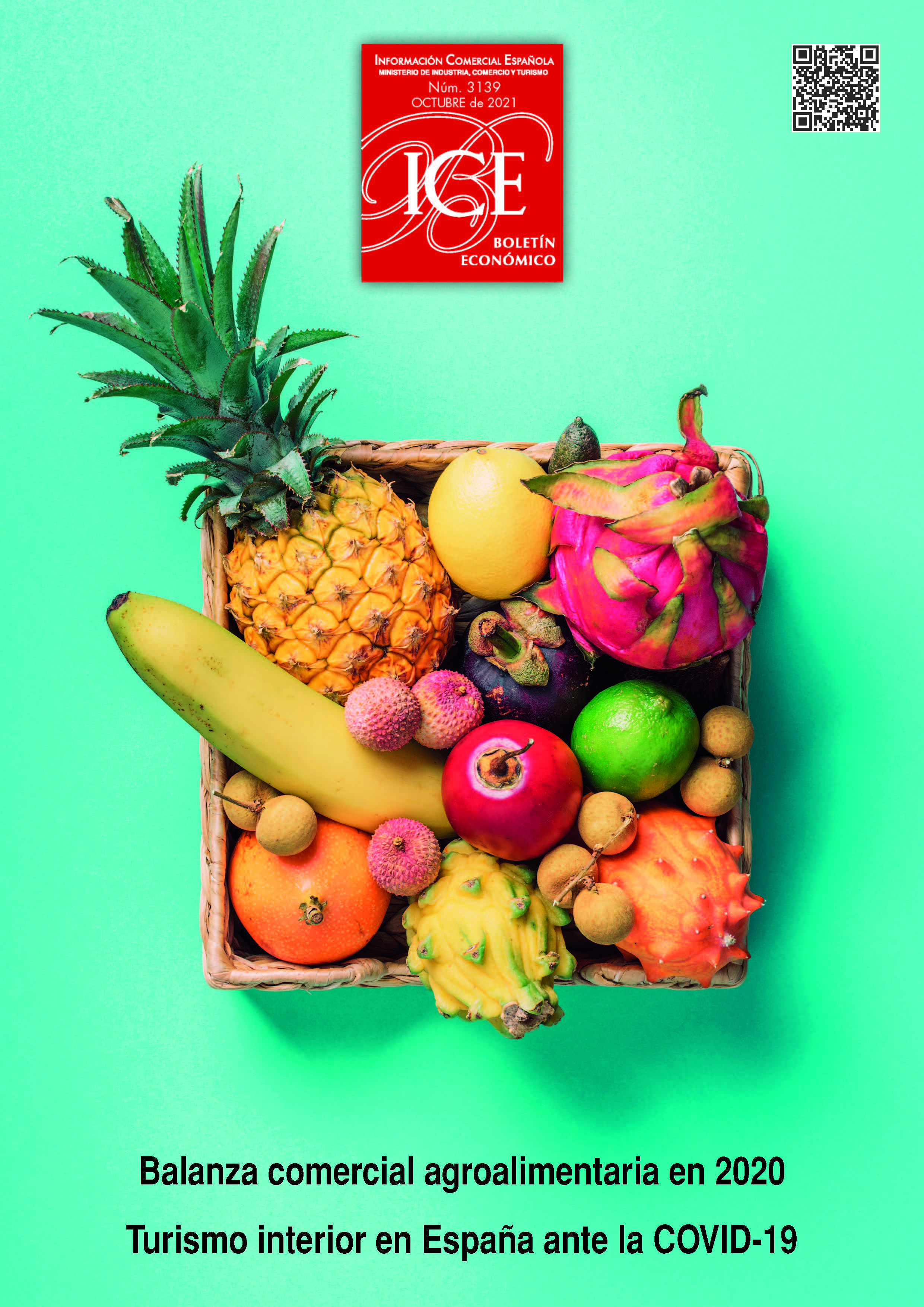El turismo interior en España ante la crisis de la COVID-19
##plugins.themes.bootstrap3.article.sidebar##
Descargas
##plugins.themes.bootstrap3.article.main##
El objetivo de este trabajo es detectar los cambios que se han producido en el turismo interior en España durante la pandemia de la COVID-19 y, sobre esa base, discutir el papel que puede desempeñar para facilitar la recuperación turística. La información estadística disponible confirma la importancia relativa que tiene el turismo interior y su potencial para compensar la caída de la demanda turística internacional. En el caso concreto de España, los datos sugieren que durante la pandemia se han sustituido los viajes internacionales por los nacionales y, más concretamente, por los realizados dentro de la propia comunidad autónoma. Respecto a las medidas implementadas por parte del Gobierno español se aprecia un sesgo a favor de las destinadas a facilitar la liquidez de las empresas, y se reconoce la capacidad que tiene el turismo interior para iniciar la recuperación.
##plugins.themes.bootstrap3.article.details##
- Beatriz Benítez-Aurioles, Mercados a través de internet , Boletín Económico de ICE: Núm. 3104 (2018): Estadísticas de exportaciones de material de defensa y de doble uso en 2017
- Beatriz Benítez-Aurioles, El impacto de la pandemia en el mercado de los alojamientos turísticos en España: hoteles versus alojamientos p2p , Boletín Económico de ICE: Núm. 3143 (2022): Febrero de 2022
Arbulú, I., Razumova, M., Rey-Maquieira, J., y Sastre, F. (2021). Can domestic tourism relieve the COVID-19 tourist industry crisis? The case of Spain. Journal of Destination Marketing & Management, 20. https://doi.org/10.1016/j.jdmm.2021.100568
Archer, B. (1978). Domestic tourism as a development factor. Annals of Tourism Research, 5(1), 126-141. https://doi.org/10.1016/0160-7383(78)90007-5
Benítez, J. J., y Cabrera, S. (2011). Análisis del turismo nacional en las comunidades autónomas peninsulares españolas: especialización y ventaja competitiva. Investigaciones Regionales, 20, 29-49. https://ebuah.uah.es/xmlui/bitstream/handle/10017/28698/analisis_benitez_IR_2011_N20.pdf?sequence=1&isAllowed=y
Blake, A., y Sinclair, M. T. (2003). Tourism crisis management: US response to September 11. Annals of Tourism Research, 30(4), 813-832. https://doi.org/10.1016/S0160-7383(03)00056-2
Comisión Europea. (2020). Comunicación (Com (220) 550 final) de 13 de mayo de 2020, de la Comisión al Parlamento Europeo, al Consejo, al Comité Económico y Social Europeo y al Comité de las Regiones sobre El turismo y el transporte en 2020 y en adelante. https://ec.europa.eu/info/sites/default/files/communication-commission-tourism-transport-2020-and-beyond_es.pdf
Cooper, M. (2006). Japanese tourism and the SARS epidemic of 2003. Journal of Travel & Tourism Marketing, 19(2-3), 117-131. https://doi.org/10.1300/J073v19n02_10
Cortés- Jiménez, I. (2008). Which type of tourism matters to the regional economic growth? The cases of Spain and Italy. International Journal of Tourism Research, 10(2), 127-139. https://doi.org/10.1002/jtr.646
De Sausmarez, N. (2007). The potential for tourism in post-crisis recovery: Lessons from Malaysia's experience of the Asian financial crisis. Asia Pacific Business Review, 13(2), 277-299. https://doi.org/10.1080/13602380601045587
Exceltur. (2021). Barómetro de la rentabilidad de los destinos turísticos españoles. Exceltur, Alianza para la excelencia turística, (32). https://www.exceltur.org/wp-content/uploads/2021/02/Baro%CC%81metro-Rentabilidad-y-el-Empleo-Enero-Diciembre-2020.pdf
Fullea, C., y Fernández, A. (2021). La Encuesta de Turismo de Residentes (ETR/FAMILITUR). Revista de Estadística y Sociedad, (80), 21-25. http://www.revistaindice.com/numero80/p21.pdf
Gobierno de España. (2020). Plan de impulso para el sector turístico: hacia un turismo seguro y sostenible. https://www.lamoncloa.gob.es/serviciosdeprensa/notasprensa/industria/Documents/2020/20062020_PlanTurismo.pdf
Goh, C., Li, H., y Zhang, Q. (2015). Achieving balanced regional development in China: is domestic or international tourism more efficacious? Tourism Economics, 21(2), 369-386. https://doi.org/10.5367/te.2013.0353
Guardia, T., Muro, J., y Such, M. J. (2014). Measuring and analysing domestic tourism: the importance of an origin and destination matrix. Tourism Economics, 20(3), 451-472. https://doi.org/10.5367/te.2013.0286
Haddad, E. A., Porsse, A. A., y Rabahy, W. (2013). Domestic tourism and regional inequality in Brazil. Tourism Economics, 19(1), 173-186. https://doi.org/10.5367/te.2013.0185
INE. (2021a). Estadística de movimientos turísticos en frontera. Frontur. https://ine.es/dyngs/INEbase/es/operacion.htm?c=Estadistica_C&cid=1254736176996&menu=ultiDatos&idp=1254735576863
INE. (2021b). Encuesta de turismo de residentes. ETR/Familitur. Primer trimestre 2021. https://www.ine.es/dyngs/INEbase/es/operacion.htm?c=Estadistica_C&cid=1254736176990&menu=ultiDatos&idp=1254735576863
Jafari, J. (1986). On domestic tourism. Annals of Tourism Research, 13(3), 491-496. https://doi.org/10.1016/0160-7383(86)90033-2
Jiménez, J. L. (9 de junio de 2021). Bonos turísticos (o cómo malgastar dinero público). Nada es gratis. https://nadaesgratis.es/juan-luis-jimenez/bonos-turisticos-o-como-malgastar-dinero-publico
McKercher, B., y Chon, K. (2004). The over-reaction to SARS and the collapse of Asian tourism. Annals of Tourism Research, 31(3), 716-719. https://doi.org/10.1016/j.annals.2003.11.002
Pechlaner, H., y Frehse, J. (2010). Financial crisis and tourism. In R. Conrady y M. Buck, Trends and Issues in Global Tourism 2010 (pp. 27-38). Springer. https://link.springer.com/chapter/10.1007/978-3-642-10829-7_4
Ritchie, B. W., y Jiang, Y. (2019). A review of research on tourism risk, crisis and disaster management: Launching the annals of tourism research curated collection on tourism risk, crisis and disaster management. Annals of Tourism Research, 79. https://doi.org/10.1016/j.annals.2019.102812
Scheyvens, R. (2002). Tourism for development: empowering communities. Prentice Hall.
Scheyvens, R. (2007). Poor cousins no more: valuing the development potential of domestic and diaspora tourism. Progress in Development Studies, 7(4), 307-325. https://doi.org/10.1177/146499340700700403
Sheldon, P., y Dwyer, L. (2010). The global financial crisis and tourism: Perspectives of the academy. Journal of Travel Research, 49(1), 3-4. https://doi.org/10.1177/0047287509353191
Škare, M., Ribeiro, D. E., y Porada-Rocho´n, M. (2021). Impact of COVID-19 on the travel and tourism industry. Technological Forecasting and Social Change, 163. https://doi.org/10.1016/j.techfore.2020.120469
Smeral, E. (2009). The impact of the financial and economic crisis on European tourism. Journal of Travel Research, 48(1), 3-13. https://doi.org/10.1177/0047287509336332
Tourinews. (5 de junio de 2021). ¿Qué comunidades autónomas han puesto en marcha el 'Bono Turístico'? https://www.tourinews.es/espana/bono-turistico-comunidades-autonomas-resumen_4464531_102.html
UNWTO. (2020a). Tourism back to 1990 levels as arrivals fall by more than 70%. https://www.unwto.org/news/tourism-back-to-1990-levels-as-arrivals-fall-by-more-than-70
UNWTO. (2020b). UNWTO briefing note – Tourism and COVID-19, Issue 3. Understanding domestic tourism and seizing its opportunities. Madrid: UNWTO. https://doi.org/10.18111/9789284422111
UNWTO. (2021). 2020: Worst year in tourism history with 1 billion fewer international arrivals. https://www.unwto.org/news/2020-worst-year-in-tourism-history-with-1-billion-fewer-international-arrivals


